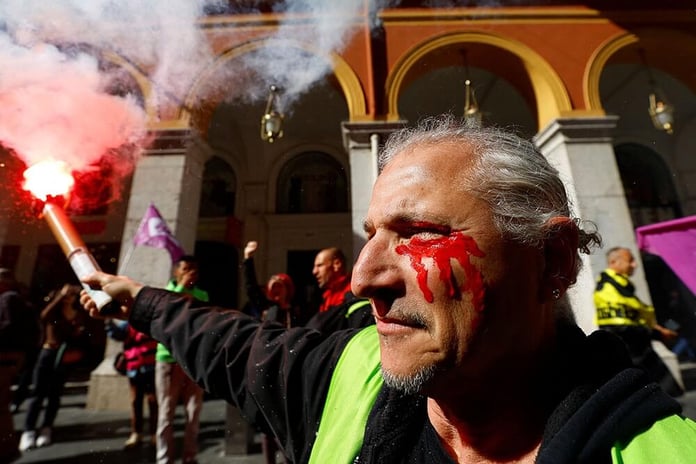Chinese President Xi Jinping, parting ways with Russian President Vladimir Putin, has not coincidentally noted that the changes underway are the biggest in a hundred years. A hundred years ago, the old world was rapidly departing. Empires crumbled, the structure of societies changed, old ideologies became radicalized, trying to meet people’s demands or steer them in the right direction. Two world wars, a world-class economic crisis, the revival of all possible local conflicts, social experiments that, as a rule, cost people dearly – all this is a sign of the very changes that the Chinese leader remembered. To relive something similar – you do not wish the enemy. Yet there is a glimmer of hope for the emergence in recent decades of certain restrictions that will not allow extremes at all – from nuclear weapons to the ability to respond more flexibly to socio-economic upheaval.
In recent days, the news seems to confirm the acuteness of the tension. In Germany, the biggest strike in decades transport workers protested against deteriorating working conditions. France is on fire after the government decided to raise the retirement age without going through a parliamentary vote, since this reform did not win a majority. In Israel – the fiercest confrontation over the cabinet of ministers’ intention to limit the powers of the judiciary – opponents see it as an attempted coup.
It is clear that each of the mentioned events has its own context and there is no direct connection between them. One thing unites them – all are manifestations of a painful social and political transformation. The second half of the 20th century and the beginning of the 21st century were a very comfortable period for the world as a whole. This concerned the general geopolitical structure – first a fairly strong equilibrium based on bipolar confrontation, then – a relatively stable hegemony. But on the socio-economic level, progress was evident.
After World War II, there were many positive changes. The welfare state model has spread across most of Europe, and even the United States, where the welfare state tradition is much more modest, has made great strides in this direction. On the other side of the “Iron Curtain”, a “humanization” was also taking place – the task of raising the standard of living and consumer diversity was beginning to be put on an equal footing with the traditional priorities of the defense capability. In the “Third World”, colonial possessions disappeared, new states were not always up to the task, but, at least, there was enthusiasm for the freedom gained and faith in the coming.
The interdependence of the world does not allow anyone to isolate themselves from the unstable general context, it spreads in various forms beyond state borders
The end of the Cold War filled with new expectations. The “free world” benefited from the “peace dividend” (reduced military expenditure) and the possibility of expanding its economic expansion into previously closed spaces. The former socialist countries, which did what they could, but used openness, at least for individual citizens, there were noticeably more opportunities than before. This was often done at the expense of state potential, but it was thought that this was just the general trend – personality is more important. Finally, the ancient “third world” tried to extract these and other advantages. Many countries in Asia, for example, have gained a great deal from globalization. And residents of less successful states chose to move to prosperous countries in Europe and America.
Both periods had one thing in common – a widespread feeling that tomorrow will be better than yesterday. And soon it’s over. It is now customary to castigate political elites for their lack of professionalism and poor governance. Without justifying specific politicians, let us note that their current generation, brought up in these very favorable conditions, has had to face up to tectonic mutations. The exhaustion of the old financial model of the capitalist economy, the communication revolution, one of the most important results of which is the mental gap between adults and young people, technological changes with inevitable consequences on the market of work, the aging of populations in developed countries and rejuvenation in problem countries – all this creates completely different international conditions. Moreover, the interdependence of the world does not allow anyone to isolate themselves from the general unstable background; it spreads in various forms beyond state borders. By the way, just like a century ago, the growth of social and political activity of the masses leads to the radicalization of political groups. And since parties and traditional ideologies are in deep crisis, radicalization can take quite archaic forms.
Take the example of Chinese President Xi Jinping, who sees in the changes underway the signs of a necessary renewal. Let’s deal with costs one way or another.


